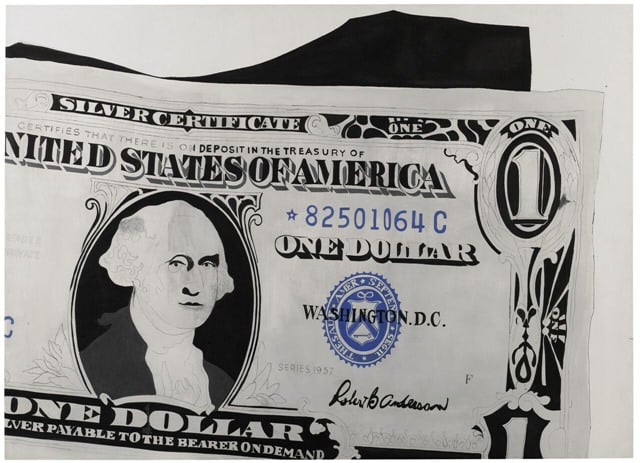
When Andy Warhol was looking for a way to make his name in the New York art world in the early 1960s, he asked friends for suggestions about what to paint.
“Finally,” he said, “one lady friend asked the right question: ‘Well, what do you love most?’ That’s how I started painting money.”
The Pop artist’s first hand-painted dollar bill canvas, One Dollar Bill (Silver Certificate), from 1962, sold minutes ago at Sotheby’s London for $32.8 million, the biggest price fetched so far for a contemporary artwork at a busy week of sales there. Christie’s sold $150.1 million’s worth of art on Tuesday, with records set for Chris Ofili, R.H. Quaytman and four other artists; a Phillips sale netted $28.6 million and set a record for an Ai Weiwei work on Monday.
One Dollar Bill edged past its high estimate of $26.5 million (estimates don’t include the house’s fee, while the sale price does). Warhol painted it based on a photograph of currency that he commissioned from his friend Edward Wallowitch, according to Sotheby’s. His business manager, Frederick Hughes, was the first owner of the painting; from him it went to Zurich’s Galerie Bruno Bischofberger, where the seller picked it up in 1997.
The Sotheby’s dollar bill, measuring about six feet wide, is the only one he painted by hand before hitting on his silk-screen technique; his silk-screen painting 200 One Dollar Bills commanded $43.7 million at Sotheby’s in 2009.
Warhol painted his famous Campbell’s Soup cans the same year as the Sotheby’s dollar painting, showing them at Los Angeles’ Ferus Gallery.
“I like money on the wall,” Warhol said in 1975. Warhol talked a lot about cash.
“The best way I like to carry money, actually, is messy,” he also said. “Crumpled wads. A paper bag is good.”